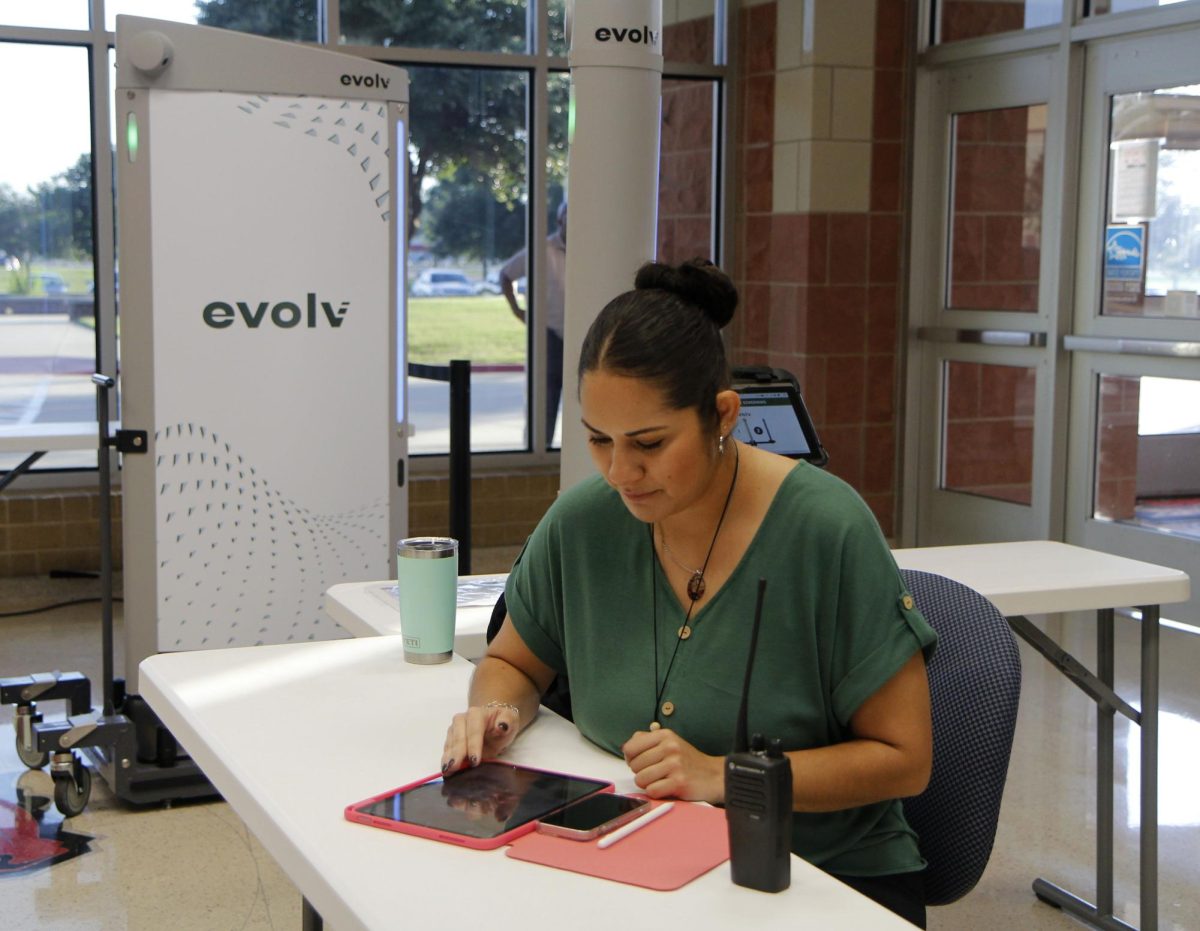
In fall of 2023, administrators installed Evolv security detection technology at the front and back doors of Legacy and other MISD schools as an attempt to detect potential threats and weapons in students’ bags as they enter the school. Evolv machines should stay in schools while administrators continue to make necessary changes to improve its effectiveness.
Evolv technology uses Artificial Intelligence to detect concealed weapons. AI continues to become more and more advanced by the day which means that systems such as Evolv will follow. As the detection improves, so will the safety on school campuses.
All high schools in MISD use Evolv technology. As students walk in the doors, they pass off their chromebooks and walk through the machine. AI in the system flags metal and other potential concealed weapons in students’ bags, sending them off to administrators who search backpacks and instrument cases. The entire process usually takes only a couple of minutes, and if lines are long, students can receive passes to class. It’s simple, provides security and protects parents, students and staff by adding another layer for potential threats to have to pass.
Opponents of Evolv technology point out that the detecting system can be faulty and cause students to need their bag searched for simple things like water bottles, binders and so on. Some band students will have to get their instrument case checked every single day. Keeping that in mind, many improvements have been made to the system since the beginning of the year due to staff marking said items as harmless. The technology will continue to improve and filter out unnecessary flags. Opponents also argue that because of so many random things getting flagged, admin could potentially skip over a real threat, blaming the alert on a school binder. While this is a concern, the system increases the chances of finding a weapon ahead of time than if bags weren’t getting scanned at all. Additionally, opponents are upset at the cost of keeping Evolv in schools. MISD is paying $40,000 per year for this feature which may seem like a lot, but ultimately the peace of mind that this blanket of security brings to students and parents is worth the price.
The Evolv system, though imperfect, adds a blanket of safety to our school. The board should continue to install Evolv systems while looking for ways to improve their effectiveness and add even more layers of protection for students.
Earlier this month, The Rider Online published a news article discussing the increase in sensitivity to the Evolv Security systems MISD implemented across the district. The facts are simple: In an attempt to improve campus security, Mansfield schools will require students to remove any metal items from their bag, place them on a table to the side and step through the metal detector. The Evolv system’s updated sensitivity detects anything containing metal, so students are constantly flagged for the smallest of their bags’ contents. As it stands, the Evolv system is proving inefficient, counterproductive and falsely advertised. Instead, MISD should either consider a more effective security system—one without so many false positives.
Evolv is a company and a security system under fire. Its CEO, Peter George, was recently terminated in the wake of two federal investigations and a class action suit by shareholders alleging Evolv misrepresented its ability to detect weapons. Ambridge Area School District and in Pennsylvania recently implemented the very systems we have in Mansfield, and they’re seeing the same problems. Studies prove Evolv’s failure to detect 42% of knives and a small number of guns. Additionally, the Utica City School System in New York purchased the Evolv system, and the district said it failed to detect a gun and multiple knives. UCSD sued after a student smuggled a hunting knife into the high school and attacked another, stabbing him several times. Not to mention Ambridge and Utica City are but two school districts of—according to Evolv Technology—800-and-counting.
MISD-specific security failures are not to go without mention, though. On Nov. 14, an incident at Timberview High School involving an undetected knife led to two injured students, an arrest and increased security. This altercation took place one day before MISD increased sensitivity in its systems, and yet the precedent has been set.
The Evolv systems are ineffective at best and dangerous at worst. Furthermore, of the, on average, 3,047 daily screenings, 12% are stopped for a bag check. That’s 366 students stopped, and each student’s screening takes roughly two minutes from the original alert to queuing for bag check to being allowed to go to class. The only system keeping that process from taking three hours is Legacy’s multiple entrances, which cuts the average traffic to a cumulative one hour. Students still arrive to class 10, 15 and even 20 minutes late, which risks their attendance and valuable class time.
However, Evolv is not without some success. In spite of its struggles to detect weapons, the metal detectors provide the same service as any other visible security measure: avoidance via presence. When students see the metal detectors and step through them each day, they are provided with a semblance of security. What’s more, in combination with an updated sensitivity, the Evolv systems detect smoking/vaping paraphernalia. Weapon detection is a work in progress, but the connotation of safety is acknowledged. MISD Evolve security system is faulty and replaceable, and district administrators need to reconsider their options to honor students’ class time. There are alternatives to Evolv that are continuing to be produced, and if their court appearances should tell you anything, it’s that those alternatives are looking better and better. There isn’t any one perfect solution to ensuring the safety of students in MISD, but a better-researched, more efficient system is worth considering.

Your donation will support the student journalists of Mansfield Legacy High School. Your contribution will allow us to purchase equipment and cover our annual website hosting costs and travel to media workshops.





